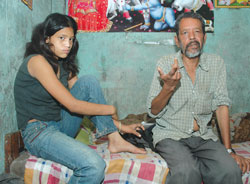|
|
Walking through the congested lanes of Samakhusi, 14-year-old Puja Nepali warns that her house will be swarming with people when we arrive.
"They're all displaced like us and are so desperate, ten rupees makes them happy," she says, leading us to the small room she, her father, and two brothers cook, sleep, and live in. (above, Puja and her father Gorkhay) One brother lies on the family bed nursing a head wound he got from the local boys who resent the influx of displaced people. The eldest brother has acute gastroenteritis, but has no cash to get to hospital. Their father Gorkhay, also ill, begs for help. "We have lost everything," says the 56-year-old.
Six years ago, Puja's mother was killed in the crossfire between the Maoists and army in Kalikot. The Rs 50,000 compensation the family received was the only aid they have ever received from the state.
Like the Nepalis, thousands of other internally displaced people in Kathmandu and elsewhere are at the end of their rope. It is becoming increasingly difficult to ask for help. Families are turned away from government agencies and NGOs, who say that now the only place to get assistance is the Peace and Reconstruction Ministry which has \'lots of money\' to help people like them.
Despite the peace agreement and a commitment by the CPN-M to guarantee the safe return of internally displaced people (IDPs), over 70,000 Nepalis still do not want to go home because of fear and a lack of trust in the Maoists, says a new report by the UN Office of the Coordination for Humanitarian Affairs (OCHA), OHCHR, the Norwegian Refugee Council (NRC), International Red Cross, and the IDP protection working group.
The majority of the displaced are children and young people. "Most of the children will never return home, as many have lost both parents, to the conflict and displacement," says Bed Prasad Bhattarai of the National Human Rights Commission. Social workers say young internal refugees are exploited even more than other Kathmandu street children while hunting for work.
The biggest hurdle to starting over is the difficulty in getting citizenship certificates, since these are only issued in home district headquarters. This means not having a number of opportunities, including the right to a government scholarship. "Getting citizenship is a huge problem for the IDPs, as there is little chance the younger ones will ever return home," says Angela Lenn of the Norwegian Refugee Council, which provides legal assistance to IDPs.
The NRC has been regularly requesting the Home Ministry and the Ministry for Peace and Reconstruction to direct local government authorities to prepare civil documentation for displaced people, but there has been no response. Earlier this year, the government formulated the 'National Policies on IDPs', but NGOs say implementation has been zero.
For families like the Nepalis and Kusum Raoul, a mother of six from Humla, things couldn't get worse. "My children are sicker in this city than they ever were in our village," she says. All seven work as domestic labour in appalling conditions.
"In a society where there is already a lot of discrimination against women, inequities increase for internally displaced people," says Lenn. Women IDPs whose husbands were killed or disappeared get the worst of it. For example, relatives might refuse widows their share of family property and threaten Maoist retaliation if she goes to court.
"My husband's family said I'd face severe consequences if I returned," says 25-year old Chandrakala Adhikari. Her husband was executed in Gorkha in 2004 for refusing to join the \'PLA\'. Adhikari and her two young sons live with 36-year old Sabitri Regmi, who has a similar story. The two women and their total of nine children live in one small room. Neither has land or savings, and together they earn about Rs 100 a day making candles.
Some women become commercial sex workers. "I'd do anything for my children, and I had no options," one tells us. There are numerous instances of displaced women being sexually harassed, exploited, and raped.
Officially, some 200 displaced widows live in Kathmandu, say NGOs. But unofficial estimates count hundreds, even thousands, more here and in other cities who are afraid to speak out.



